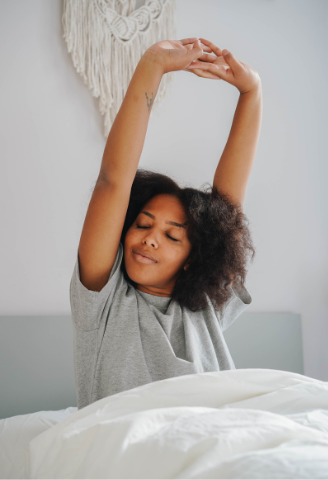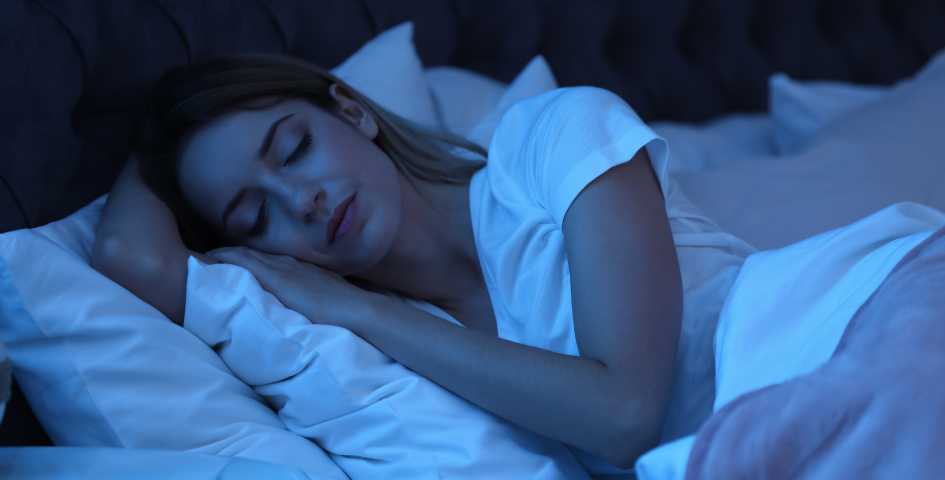Maximizing your body’s natural cycles is a valuable component of your fertility journey. The human body and birth are composed of thousands of patterns and rhythms. Everything, from heartbeats to cell regeneration, from menstruation to labor, has its own unique timing and ideal operating patterns.
Sleep and circadian rhythms are significant daily cycles to prioritize during conception. Proper sleep can aid in creating and balancing reproductive hormones. This article will demonstrate ways you can optimize your nightly sleep to improve your body’s chances of conception.
How Sleep and Fertility Relate
While a relationship between sleep and fertility has been established, the degree to which sleep or sleep disturbances directly affect fertility is still largely unknown. To date, the majority of the research on this subject has been conducted on shift work. Negative reproductive health outcomes — menstrual irregularities, increased time to conception, increased miscarriages — were observed in this kind of work. This led researchers to believe sleep disturbances could negatively impact reproduction, though conclusive results have yet to be developed.
According to Sleep Medicine Reviews, what is “well-established is that sleep modulates a variety of hormonal functions.” Research shows sleep disturbances impact individual reproductive hormones such as Thyroid Stimulating Hormone (TSH), Luteinizing Hormone (LH), and Follicle Stimulating Hormone (FSH) to varying degrees. Since reproduction requires a synchrony of hormones, it’s hypothesized that sleep disturbances could play a significant role in interrupting the hormones needed for reproduction.
It’s important to note, that while most research involved shift workers, sleep disturbances or circadian dysrhythmia can affect anyone. If you suspect that you or your partner is not getting enough sleep, look for physical signs of poor sleep such as brain fog or grogginess, dry mouth, acne breakouts, or mood swings. These physical indicators, as well as a rough daily estimate of your previous night’s sleep, will help in identifying if sleep could be negatively impacting you.
5 Tips for Optimizing Your Sleep Environment
Sleep represents an important element of self-care for couples. To improve your sleep and the likelihood of deep sleep, start by focusing on your senses. At night, what do you see, hear, feel, touch, or even smell? And what makes you feel relaxed? Here are five tips for answering these questions to optimize your sleep environment and ultimately your sleep:
Focus on Lighting
Natural light exposure is critical to the body’s circadian rhythms. Light enters through the eyes and sends information to the brain about the time of day. When eyes sense darkness, this prompts the body to produce and release melatonin, the sleep hormone, which naturally allows you to sleep.
For these reasons, avoid artificial light, especially blue light, right before bed. Instead, surround yourself with warm tones like the light produced in a sunset. Also, be sure your environment is dark when you are ready to sleep. Consider blackout curtains if there is unnecessary ambient light in your bedroom.
Eliminate Disruptive Sounds
Sounds, especially sharp sounds, elicit a fight or flight stress response in the body causing sleep to be disturbed. Even dull sounds can pull sleepers out of a deep sleep cycle. As much as possible, try eliminating sounds that you notice; sounds that bother you before falling asleep or sounds that have woken you up in the night.
If you can’t eliminate the source of distracting sounds, try utilizing a sound machine or a fan to muffle the sounds. White noise and similar noises can reduce the risk of triggering a stress response that would disturb your body’s relaxed state.
Find the Right Room Temperature
As part of the sleep process, the body naturally decreases its temperature. According to sleep psychologist, Michelle Drerup, the ideal sleeping temperature is between 60 to 67 degrees Fahrenheit. She likened the ideal sleep environment to a ‘cave,’ saying “It should be cool, dark, and quiet to enhance your sleep.”
Turning down the thermostat will allow you to sleep at this ideal temperature. As an added bonus you will be lowering the cost of heating and cooling at the same time. If you’re in a hotter climate, get a high-quality ceiling fan instead of relying on AC. If it’s too cold where you are, consider improving your home’s insulation and use an energy-conserving space heater instead of relying on central heating and natural gas. These techniques can keep you and your partner comfortable, while you experiment with the ideal sleep temperature, and can save you from additional expenses.
Select Comfortable Bedding
There are many different opinions and options when it comes to selecting bedding. Some people like the feel of a firm mattress and cool bedding. Others may like a soft mattress and warm bedding. What is important is that you and your partner feel comfortable and are not overtly distracted by the bedding.
If you feel sore, itchy, uncomfortable, or annoyed at how lying in bed feels, it may preoccupy your mind and increase your stress, making it harder to fall asleep and get good rest. It may be worth trying another bedding option that can put you at ease and help you relax.
Create a Relaxing Environment
Releasing stress whether it’s physical, emotional, mental, or stress caused by infertility is crucial to getting the body to relax enough to produce sleep hormones, slow the heartbeat, and enter into deep sleep. Stress releases cortisol, a hormone that increases blood sugars, in the body to prepare for a fight or flight response. This response makes quieting the mind and body more challenging which is why establishing a sleep environment that feels relaxing can help.
Try utilizing colors and decorations that make you feel happy, this releases endorphins in your mind that naturally reduce stress. You can even use the power of scents by diffusing or spraying calming smells like lavender before bed. Regardless of what you do, be sure the steps you take create a relaxing sleep space that makes you feel safe, comfortable, and happy.
 Conclusion
Conclusion
To sum up, no matter where you are on your fertility journey, focusing on refining your body’s natural cycles — particularly the circadian sleep cycle — can improve your chances of conception. Sleep and fertility have been loosely connected and there is evidence that sleep disturbances can upset the body’s reproductive hormones. In this way, prioritizing proper sleep can aid in maintaining the body’s hormones and thereby aid in contraception.
One way to get more sleep is to optimize your sleep environment. You can achieve this by using your senses as a guide to creating the most comfortable and relaxing bedroom for you and your partner. This sleep environment should support you in your parenting aspirations and beyond.
If you would like to learn more about GENESIS Fertility New York or are ready to schedule an appointment, please speak with one of our representatives at 929-605-5467.






